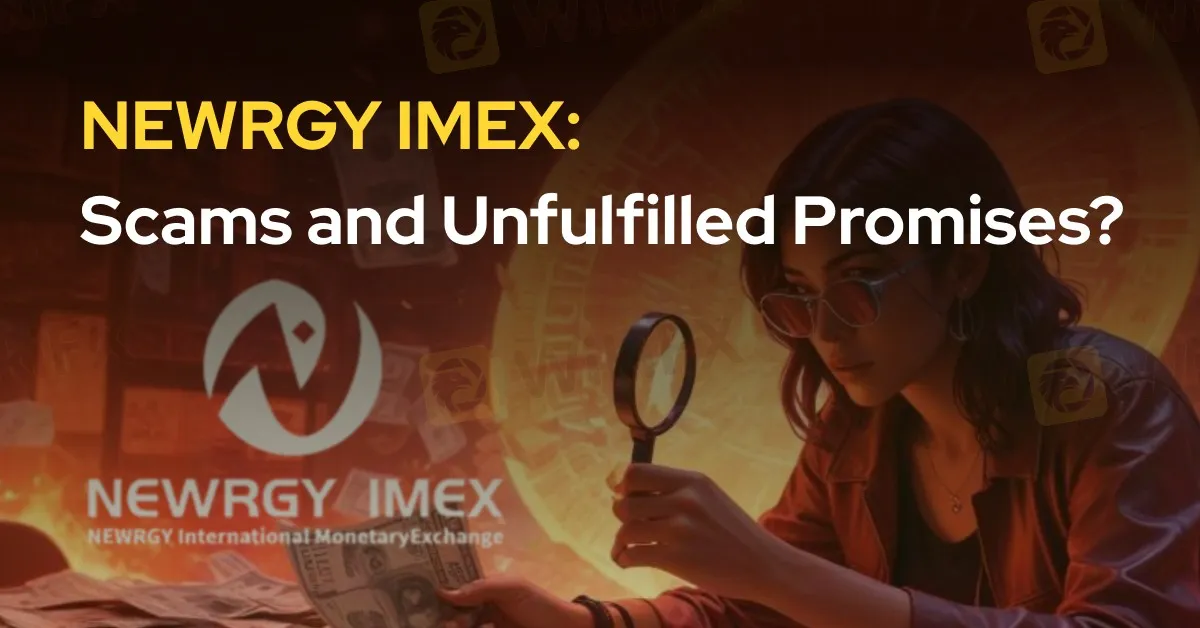简体中文
繁體中文
English
Pусский
日本語
ภาษาไทย
Tiếng Việt
Bahasa Indonesia
Español
हिन्दी
Filippiiniläinen
Français
Deutsch
Português
Türkçe
한국어
العربية
NEWRGY IMEX: Scams and Unfulfilled Promises?
Abstract: This exposure aims to shed light on the fraudulent practices of NEWRGY IMEX, with a particular focus on the case of Ulises , a victim from Mexico who has shared his distressing experience.

Introduction
In recent weeks, WikiFX has been inundated with alarming complaints against NEWRGY IMEX, a broker that has reportedly scammed numerous traders. This exposure aims to shed light on the fraudulent practices of NEWRGY IMEX, with a particular focus on the case of Ulises , a victim from Mexico who has shared his distressing experience.
The Story of Ulises
Ulises , a 36-year-old trader from Mexico, found himself entangled in a scam that has left him and many others in financial distress. According to his account, he invested $2,000 with NEWRGY IMEX, only to face a series of deceptive tactics that ultimately led to the complete loss of his funds.
Initially, NEWRGY IMEX prevented withdrawals by claiming that an audit was being performed in preparation for going public. This excuse was used to stall the process, leaving traders like Luna in a state of uncertainty. However, even after the audit was supposedly completed, the broker continued to block withdrawals, citing a new reason: an alleged IRS tax payment.
The situation took a turn for the worse when NEWRGY IMEX's website was suddenly disabled, and Lunas funds were not recovered. This pattern of behavior—blocking withdrawals under false pretenses and then disappearing—typifies what is known as a “rug pull” scam. Such schemes involve inflating the value of a product or investment to create a false sense of profitability, only to collapse and disappear with the investors' money.










Warning to Traders
WikiFX has taken immediate action to expose NEWRGY IMEX's fraudulent activities and protect the interests of traders. The case of Ulises is a stark reminder of the risks associated with unregulated and dubious brokers. As of now, NEWRGY IMEX appears to be on the brink of vanishing, with indications suggesting that it may disappear entirely after August 16, 2024.
WikiFXs Efforts
WikiFX is committed to safeguarding the legitimate rights and interests of forex traders. We are actively reaching out to Ulises and other affected traders to gather more evidence and resolve these issues. Our goal is to ensure that such fraudulent brokers are exposed and held accountable.

Conclusion
Traders are urged to exercise extreme caution when dealing with forex brokers, especially those with questionable legitimacy. The case of NEWRGY IMEX highlights the importance of thorough due diligence and vigilance to avoid falling victim to scams.
Stay tuned to WikiFX for further updates on this case and other related developments. If you have had any similar experiences or have additional information, please contact us to assist in our ongoing efforts to combat forex fraud.

Disclaimer:
The views in this article only represent the author's personal views, and do not constitute investment advice on this platform. This platform does not guarantee the accuracy, completeness and timeliness of the information in the article, and will not be liable for any loss caused by the use of or reliance on the information in the article.
Read more

Risk Involved with Cabana Capital – Every Trader Should Know
Cabana Capital has changed its name and logo, basically everything about its identity. This seems a bit suspicious, and it's something you should definitely be concerned about. In this article, you’ll learn about the red flags that every trader needs to watch out for.

CME International Records a Massive Jump in Forex Volumes
CME International recorded a record surge in its foreign exchange trading volumes during the second quarter. Check out its performance across products and markets.

Scam Brokers Exposed! FCA Warns Traders to Stay Safe
If you are into forex trading, you need to protect your money from investment scams. Many scam brokers are active in the market now. The FCA, a reputed financial regulator, has issued a list of unlicensed brokers you need to stay away from.

New to Forex Trading in India? Here's How You Can Start and Maximize
Want to begin your forex trading journey in India? Here's a guide that will help you open and close trading positions effectively, resulting in enhanced returns and minimized risks.
WikiFX Broker
Latest News
Alchemy Markets Review 2025: Key Facts and Insights
Largest Market Makers
Temasek's portfolio scales new peak even as divestments hit over 2-decade high
Exposing Trade Capital Limited - Siphoning Millions, Restricting Withdrawals, Charging Extra Fees
GMI Edge: A Closer Look at Its Licenses
How Do I Place a Stop-loss Order?
5 Serious Warnings About Mirrox! You Can’t Afford to Ignore
FXPRIMUS: 5 Things They Don’t Want You to Know
Manual vs. Automated Forex Trading: Which One Should You Choose?
Mining firms lift FTSE 100 to record high after Trump confirms 50% copper tariff
Currency Calculator


